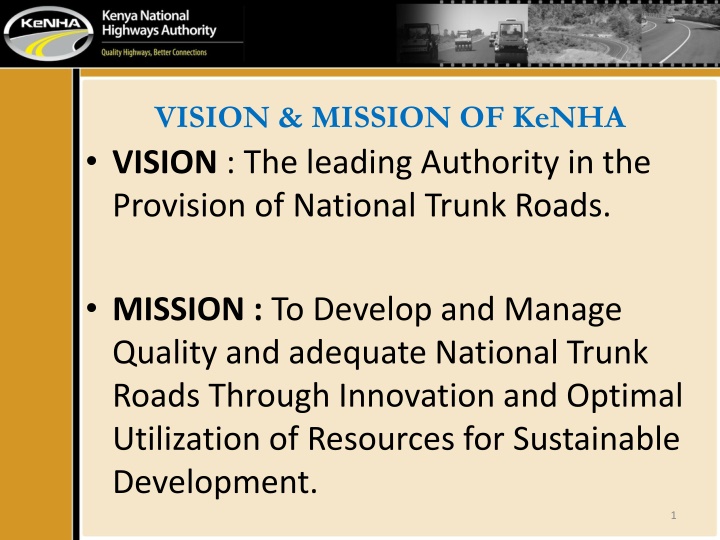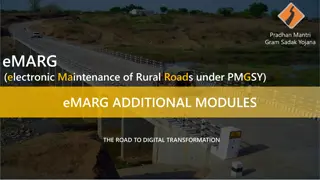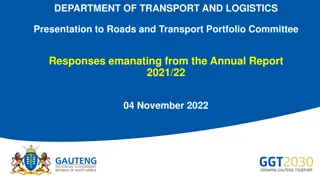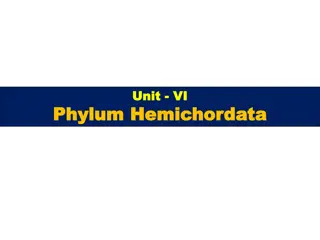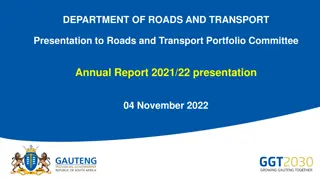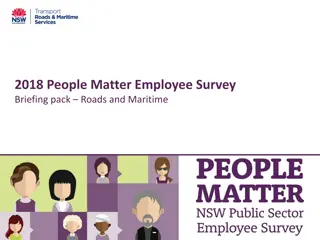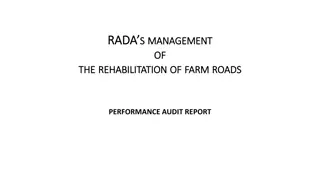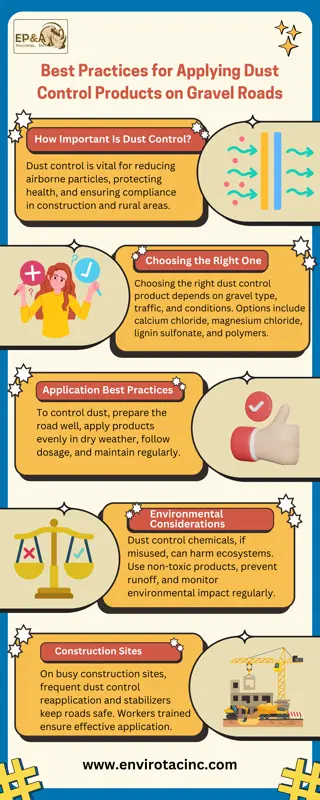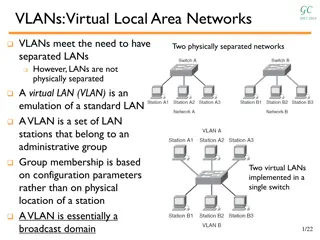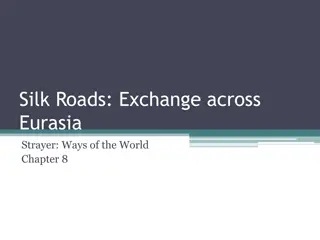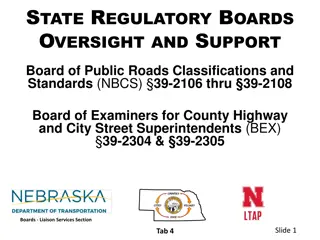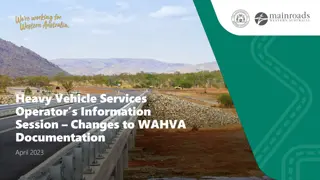Overview of KeNHA's National Trunk Roads Management
KeNHA, the leading authority in the provision of national trunk roads, aims to develop and manage quality roads through innovation and optimal resource utilization for sustainable development. The authority's mandate includes managing, developing, rehabilitating, and maintaining national trunk roads classified as A & B. Maintenance and corridor management are crucial aspects handled by regional offices and corridors A, B, & C. Roadworks contractors play a vital role in ensuring works meet specifications, while contract management follows conditions stipulated in the contract document.
Download Presentation

Please find below an Image/Link to download the presentation.
The content on the website is provided AS IS for your information and personal use only. It may not be sold, licensed, or shared on other websites without obtaining consent from the author.If you encounter any issues during the download, it is possible that the publisher has removed the file from their server.
You are allowed to download the files provided on this website for personal or commercial use, subject to the condition that they are used lawfully. All files are the property of their respective owners.
The content on the website is provided AS IS for your information and personal use only. It may not be sold, licensed, or shared on other websites without obtaining consent from the author.
E N D
Presentation Transcript
VISION & MISSION OF KeNHA VISION : The leading Authority in the Provision of National Trunk Roads. MISSION : To Develop and Manage Quality and adequate National Trunk Roads Through Innovation and Optimal Utilization of Resources for Sustainable Development. 1
MANDATE OF THE AUTHORITY KeNHA smandate is to Manage, Develop, Rehabilitate and Maintain National Trunk Roads . The national roads are classified as A & B. These are sometimes referred to as national trunk roads. 2
MAINTENANCE & CORRIDOR MANAGEMENT Maintenance Department is one of the departments charged with responsibilities to enable the Authority achieve its mandate. The primary responsibility is to ensure that all roads (except those under construction contracts) are maintained to the best possible standards using available resources. 3
MTCE & CORRIDOR MANAGEMENT The Authority has 10 Regional Offices and 3 Corridors namely; A, B & C to handle the maintenance activities as per the workplans (available budget & timing) developed annually. Regular maintenance activities are usually described as either Routine or Periodic or Performance Based Contracting (PBC). However, others like Spot Improvements or Emergencies may also be done as the need arises. 4
MTCE & CORRIDOR MANAGEMENT planning- road condition, budget Procurement [procurement] Execution [engineer] Closure [both procurement engineer] [engineer] 5
ROADWORKS CONTRACTORS The maintenance works are carried out through the services of Roadworks Contractors. The Contractors (or their Agents/Supervisors) must therefore understand the works specifications and performance requirements as laid down in the contract document signed by both parties. In this regard, Contractors must engage technically competent staff to manage the works on their behalf. 6
CONTRACT MANAGEMENT Roadworks are managed by observing the conditions and specifications as detailed in the contract document. These are:- Conditions of Contract (Parts I and II) -Part I General Conditions of Contract(FIDIC) General for Civil Engineering works. Developed by Federation Internationale des Ingenieurs Conseils (FIDIC). Copies are obtainable from FIDIC Secretariat in Lausanne, Switzerland. of conflict in any clause. -Part II Particular Application Supplement the General Conditions Contract and prevail in case 7
CONTRACT MANAGEMENT Specifications of Contract These are the Technical requirements. -Standard Specifications Standard technical & quality requirements for the works. Standard Specifications for Road and Bridge Construction, 1986 Edition published by the Ministry of Transport & Communications is in use. Copies are obtainable from the Ministry of Roads. -Special Specifications Specific to the works being done. Supplement, revise or amend the Standard Specifications. Prevail in case of conflict. 8
CONTRACT MANAGEMENT Priority Order of Contract Documents 1. The Contract Agreement (completed, signed & stamped) 2. The Letters of Award and Acceptance 3. The Tender and Appendix to Tender 4. Conditions of Contract Part II (Particular Applications) 5. Conditions of Contract Part I (General - FIDIC) 6. Special Specifications 7. Standard Specifications 8. Drawings 9. Bills of Quantities (priced) 9
CONTRACT MANAGEMENT Issues to Observe stamped by both parties, the Engineer (in our case is the General manager Maintenance) will grant you Possession of site and issue Order to commencement [Clause 41.1] 1. Order to commencement and possession of site After the Contract Agreement is completed, signed & 2. Requirement Well resourced Programme of Works superimposed with cash flow projections covering the contract period 10
CONTRACT MANAGEMENT Issues to Observe 1. Time for Completion of Works (Clause 43 of CoC) This is specified in the Appendix to Tender. Delays in completion of works attract penalty charges known as liquidated damages for each day the works remain uncompleted. Works are considered complete once a certificate of substantial completion (aka taking-over certificate) is issued by the Engineer. Half of retention money (if applicable) is released to Contractor upon issuance of this certificate, while the last half is released after the defects liability period has expired and the Contractor has completed any works that may have been outstanding, and remedied all defects that may have arisen from their workmanship. End of Defects Liability Period certificate (aka Final/Handing over certificate) must be issued by the Engineer The time for completion may be extended in accordance with Clause 44 of the Condition of Contract(CoC). 11
CONTRACT MANAGEMENT Issues to Observe 2. Rate of Progress (Clause 46 of CoC) The rate of progress should conform to the approved programme of works (Clause 14). Persistent failure by the Contractor to comply with the programme and time for completion may also lead to default (Clause 63) considerations, hence termination of contract. 12
CONTRACT MANAGEMENT Issues to Observe 3. Site Instructions These are issued in writing by the Resident Engineer, who has the delegated authority from the Engineer. Instructions may be issued verbally on site, but must be subsequently confirmed in writing. Site instructions form the contractual basis for reimbursement or compensation for works undertaken as per the BoQs and specifications. 13
Thank you Thank you 14
